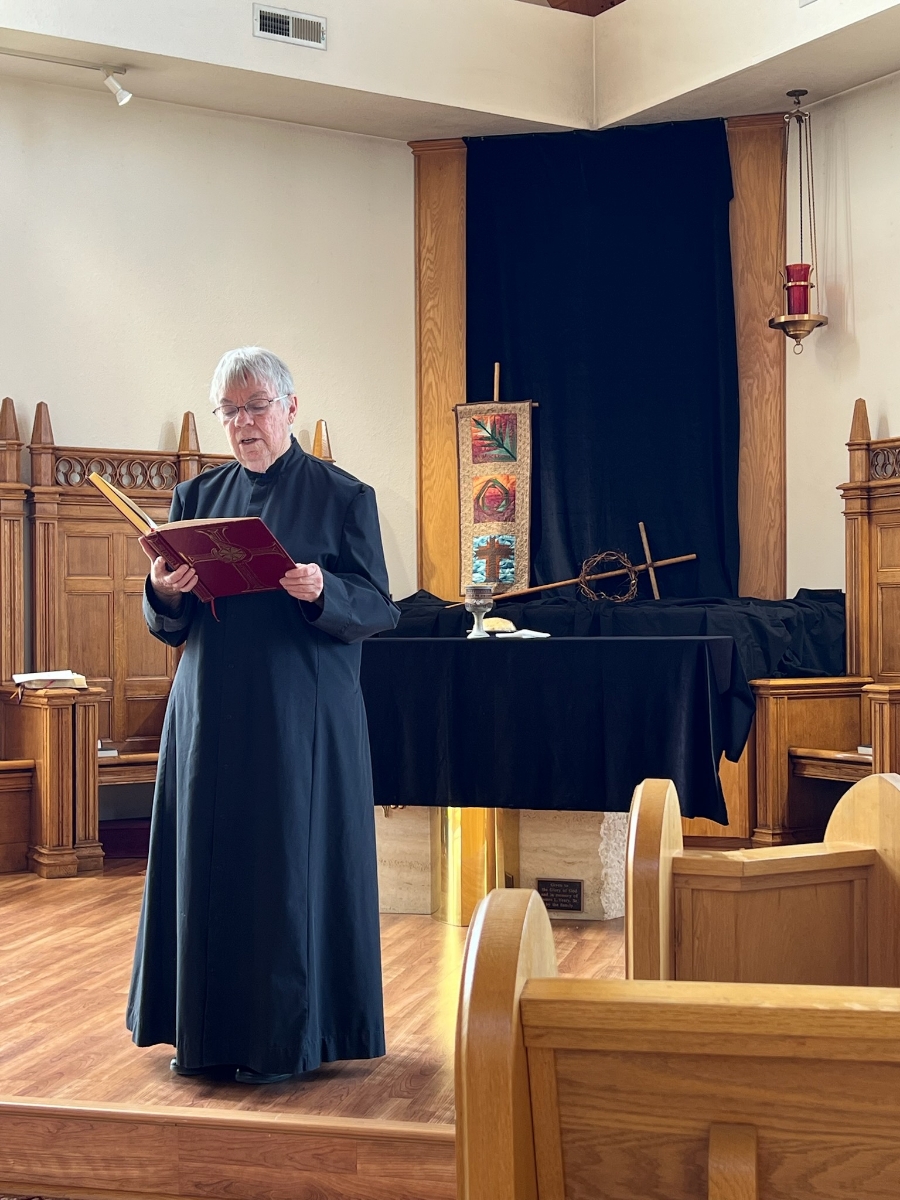Cathy Cox
Good Friday
We call this, “Good Friday,” and it is. Some people call it, “Black Friday,” and I suppose that works, too. If you remember it as “black” you think of the cruelty of the crucifixion. That is all that many people know of it. If you dare to claim it as “good” you recall with what mercy God went to this terrible length to set us free. And both are true. But neither is true enough. Neither is adequate to this.
Irrepressible glory already bursts through Jesus’ dying. It shines through IN his death, not only afterwards.
Good Friday is that tightly bound up with Easter. It is all victory, and the victory begins here. There is no separation in the mind of Paul, or of the other gospel writers. This is one event. One great, new Passover. The three days intertwine, so that already, at least under our breath, we are singing the Easter “Alleluias!”
And even on Easter, the Day of Resurrection, we will still stand to “proclaim the death of the Lord until he comes again,” and not his rising alone. But what is it that we proclaim today? How do we understand the cross?
Wooden literalism will not help us here. And too much emotion only confuses the message. The terrible joy of this mystery is too great for reason and too fierce for sentimentality. The cross means God has done everything you have hoped, and everything you have not yet dared to hope.
Listen to this, by the poet Romanos, writing in the 6th century, as he sings how the willing and obedient death of the Lord brought despair to Satan:
“Now the Devil speaks: Now then, Hell, mourn; and I join you in wailing. Let us lament as we see the tree which we planted Changed into a holy Trunk. Robbers, murderers, tax-gatherers, harlots, Rest beneath it, and make nests in its branches In order that they might gather the fruit of its sweetness From the supposedly sterile wood. For they cling to the cross as the tree of life.
That is one image, and it is a wonderful one. It is only despair for the spiritual forces of evil to see Jesus walk into death, already triumphing over sin and shame and death itself.
Here is yet another picture, this time directly from the Bible. “He disarmed the rulers and authorities and made a public example of them, triumphing over them by the cross.”
For Paul, as for the early Christian poets, the cross was nothing to be sad about; it is the place of final and glorious victory.
On the cross, Paul sings, Jesus disarmed all other powers and then exposed them to public disgrace by putting them on exhibit as his captives. Paul’s hearers would remember some Roman general leading his parade of victory, with those kings he had conquered trailing behind, hands bound, humiliated, for all to see. This is the picture he paints.
And here’s another early one.
The cross upon which Jesus died was not only an instrument of shameful death, that God turned to good, although it was that. It was also the “chariot” Jesus rode to victory over all other powers. That image was drawn from ancient mythology where morning by morning the sun god was said to ride his golden chariot across the sky claiming victory over darkness. In Christian poetry of the early centuries, and in art, Jesus was sometimes depicted driving across the cosmos on the cross, conquering the power and darkness of Sin, making even the mighty Roman sun god look dim against the brightness of his glory.
But that isn’t all! Look at our hymns –
Clement of Alexandria, writing about 200 AD penned:
Here in o’erwhelming final strife the Lord hath victory, And sin is slain, and death brings life, And earth inherits heaven’s key.” (Hymn 163)
The cross becomes the place of God’s winning battle. It becomes the throne, the place from which Jesus begins his reign, even before the Resurrection. It becomes the flowering tree of life, whose roots sink down into the earth which flowers into eternity.
The cross is also the privileged and ever-living Tree. Another 6th century hymn sings, (Hymn 162):
“O tree of beauty, tree most fair, ordained those holy limbs to bear; gone is thy shame, each crimsoned bough proclaims the king of glory now.”
And the crucifixion that was supposed to end this pernicious preacher’s influence – Well, it backfired. (Hymn 170)
“To mock your reign O dearest Lord, they made a crown of thorns,
set you with taunts, along that road, from which no one returns. They did not know as we do now, that glorious is your crown; that thorns would flower upon your brow, your sorrows heal our own.”
The cross was remembered as the place of everlasting and final triumph, not as a drama of cruel tragedy and injustice.
The cross stood alone, as the center of all human history, changing everything forever.
The cross blazed out as the heart and soul and center of faith.
The resurrection celebrates God’s stamp of approval, God’s joyous “YES!” to the stupendous, entirely unexpected and undeserved victory that Jesus won for us all on the cross.
The resurrection made it possible for Jesus’ whole story, including his death, to make sense to those first sorrowing women and men.
And we will celebrate that feast for weeks!
But the shock of sudden joy, freedom from the power of sin and slavery to death, the unimaginable reversal of the whole world’s sorry history begins here, “where all sad things are coming untrue“.

No responses yet